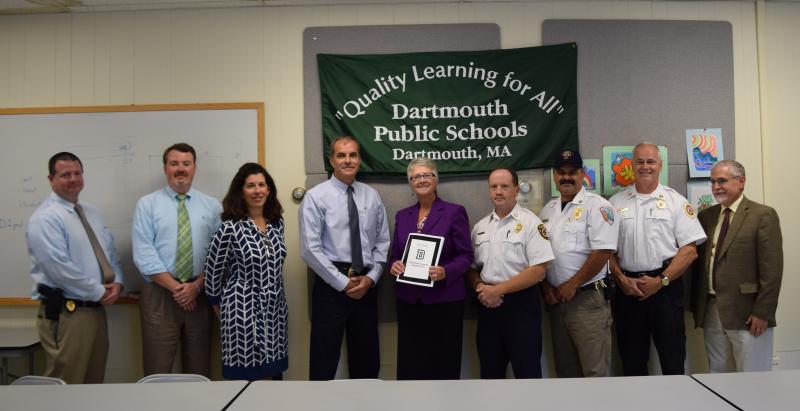New emergency plans to keep Dartmouth schools safe
Dartmouth Public Schools, along with Dartmouth’s police and fire departments and Town Administrator David Cressman recently unveiled its newly revamped Comprehensive Emergency Management Plan for all of the town’s public schools.
The new emergency plan covers all sorts of potential emergencies that Dartmouth schools might have to deal with. It includes procedures for handling everything from suspicious packages to incidents involving animals and wildlife and communicable diseases.
Superintendent Bonny Gifford said that the plans are all about providing staff with a clear and consistent way of responding to emergencies.
“It’s a guiding document for all of our staff,” Gifford said.
Gifford said the biggest change in the district’s approach to emergency planning is the adoption of ALICE protocols in the event of an intruder.
“[ALICE] is a set of proactive strategies we train or staff to engage in,” Gifford said.
ALICE is an acronym that stands for "alert, lockdown, inform, counter, evacuate." It offers more options for responding to an intruder situation, and each step of the protocol can be implemented depending on the specifics of the incident.
“Before it was lockdown, lockdown, lockdown,” Gifford explained. “With ALICE, that gives people a set of strategies. It lets people exercise judgement in a crisis situation.”
The new emergency protocols also include procedures for assessing the risk of a bomb threat. Gifford said schools won’t simply shut down in the event of a bomb threat, but will instead consider the situation and determine what to do.
Work on overhauling the existing emergency plan began before Gifford became superintendent in 2015. She said while she was interviewing for the position that she heard from staff, teachers and even students that revamping the district’s emergency plan was something that would be necessary.
Under state law, superintendents must annually review their district’s emergency procedures with the town’s police and fire departments, explained Dartmouth Fire District No. 3 Chief Richard Arruda. He said that as the plans were being reviewed, it was decided that they were in need of a major overhaul, which began a year-long process to produce a final set of new plans.
“By [reviewing the plans] we realized the plans needed an update,” Arruda said. “They didn’t include some topics prevalent in schools today.”
Through a collaborative effort between the school district, Cressman, Arruda, Dartmouth Fire District No. 2 Chief Tim Andre and District No. 3 Chief Brad Ellis, and with Dartmouth Police Chief Robert Szala, the new comprehensive emergency plan was produced over the course of about a year.
Szala noted that one of his officers, Det. Derek Kenney, was able to offer advice he picked up from a federal government training course he had recently completed. The program, called "critical infrastructure training," is offered by the Department of Homeland Security and provides training to the public and private sector on topics relating to physical security.
The new emergency plans are just one way the school district has been responding to the changing needs of school security. In 2014, the school completed a $1.6 million overhaul of main entranceways at several schools, which included adding high-tech keycard access to buildings for staff, building new security booths and installing new security cameras.













